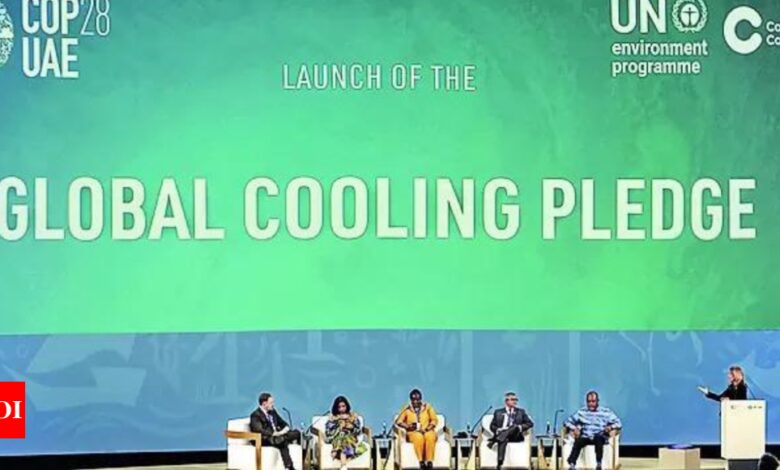India
2011-20 warmest decade on record, extreme weather events increased: WMO | India News

[ad_1]
DUBAI: The decade 2011-20 was the warmest decade on record and each decade since 1990s has been warmer than the previous one with there is no immediate sign of reversing of this trend, the World Meteorological Organization (WMO) said in a new report released on the sidelines of the UN climate conference (COP28) on Tuesday.
Released on the day the cyclone ‘Michaung’ created havoc along India’s eastern coastal cities including Chennai, the report attributed the warming trend to continued rising concentrations of greenhouse gases (GHG), noting how it led to an increase in extreme weather events and sea level rise.
“Our weather is becoming more extreme, with a clear and demonstrable impact on socio-economic development. Droughts, heatwaves, floods, tropical cyclones and wildfires damage infrastructure, destroy agricultural yields, limit water supplies and cause mass displacements,” said WMO secretary-general Petteri Taalas.
The decade (2011-20) also saw “accelerated” rise in the global mean sea level, mostly due to a speeding up of ice mass loss from the Greenland ice sheet, and, to a lesser extent, due to accelerated glacial melting and ocean warming. “From 2011 to 2020, sea level rose at an annual rate of 4.5mm/yr. This compares with 2.9 +/- 0.5mm/yr in 2001-2010,” said the WMO’s Decadal State of the Climate Report.
It said the global mean temperature for the period 2011-2020 was 1.10 (± 0.12) degree Celsius above the 1850-1900 average and more countries reported record high temperatures than in any other decade. It complements the WMO’s annual State of the Global Climate report that last week said that 2023 is set to be the warmest year on record.
“Our ocean is warming faster and faster and the rate of sea level rise has nearly doubled in less than a generation. We are losing the race to save our melting glaciers and ice sheets. This is unequivocally driven by GHG emissions from human activities. We have to cut emissions as a top and overriding priority for the planet in order to prevent climate change spiralling out of control,” said Taalas.
In a glimmer of hope, the report, however, said that the Antarctic ozone hole was smaller in the 2011-2020 period than during the two previous decades thanks to successful and concerted international action to phase out ozone depleting chemicals, an indication of the success of the Montreal Protocol.
The report documents how extreme events across the decade had devastating impacts, particularly on food security, displacement and migration, hindering national development and progress toward the Sustainable Development Goals (SDGs).
But it also showed how improvements in forecasts, early warnings and coordinated disaster management and response are making a difference. “The number of casualties from extreme events has declined, associated with improved early warning systems, even though economic losses have increased,” said the report.
Released on the day the cyclone ‘Michaung’ created havoc along India’s eastern coastal cities including Chennai, the report attributed the warming trend to continued rising concentrations of greenhouse gases (GHG), noting how it led to an increase in extreme weather events and sea level rise.
“Our weather is becoming more extreme, with a clear and demonstrable impact on socio-economic development. Droughts, heatwaves, floods, tropical cyclones and wildfires damage infrastructure, destroy agricultural yields, limit water supplies and cause mass displacements,” said WMO secretary-general Petteri Taalas.
The decade (2011-20) also saw “accelerated” rise in the global mean sea level, mostly due to a speeding up of ice mass loss from the Greenland ice sheet, and, to a lesser extent, due to accelerated glacial melting and ocean warming. “From 2011 to 2020, sea level rose at an annual rate of 4.5mm/yr. This compares with 2.9 +/- 0.5mm/yr in 2001-2010,” said the WMO’s Decadal State of the Climate Report.
It said the global mean temperature for the period 2011-2020 was 1.10 (± 0.12) degree Celsius above the 1850-1900 average and more countries reported record high temperatures than in any other decade. It complements the WMO’s annual State of the Global Climate report that last week said that 2023 is set to be the warmest year on record.
“Our ocean is warming faster and faster and the rate of sea level rise has nearly doubled in less than a generation. We are losing the race to save our melting glaciers and ice sheets. This is unequivocally driven by GHG emissions from human activities. We have to cut emissions as a top and overriding priority for the planet in order to prevent climate change spiralling out of control,” said Taalas.
In a glimmer of hope, the report, however, said that the Antarctic ozone hole was smaller in the 2011-2020 period than during the two previous decades thanks to successful and concerted international action to phase out ozone depleting chemicals, an indication of the success of the Montreal Protocol.
The report documents how extreme events across the decade had devastating impacts, particularly on food security, displacement and migration, hindering national development and progress toward the Sustainable Development Goals (SDGs).
But it also showed how improvements in forecasts, early warnings and coordinated disaster management and response are making a difference. “The number of casualties from extreme events has declined, associated with improved early warning systems, even though economic losses have increased,” said the report.
#warmest #decade #record #extreme #weather #events #increased #WMO #India #News






